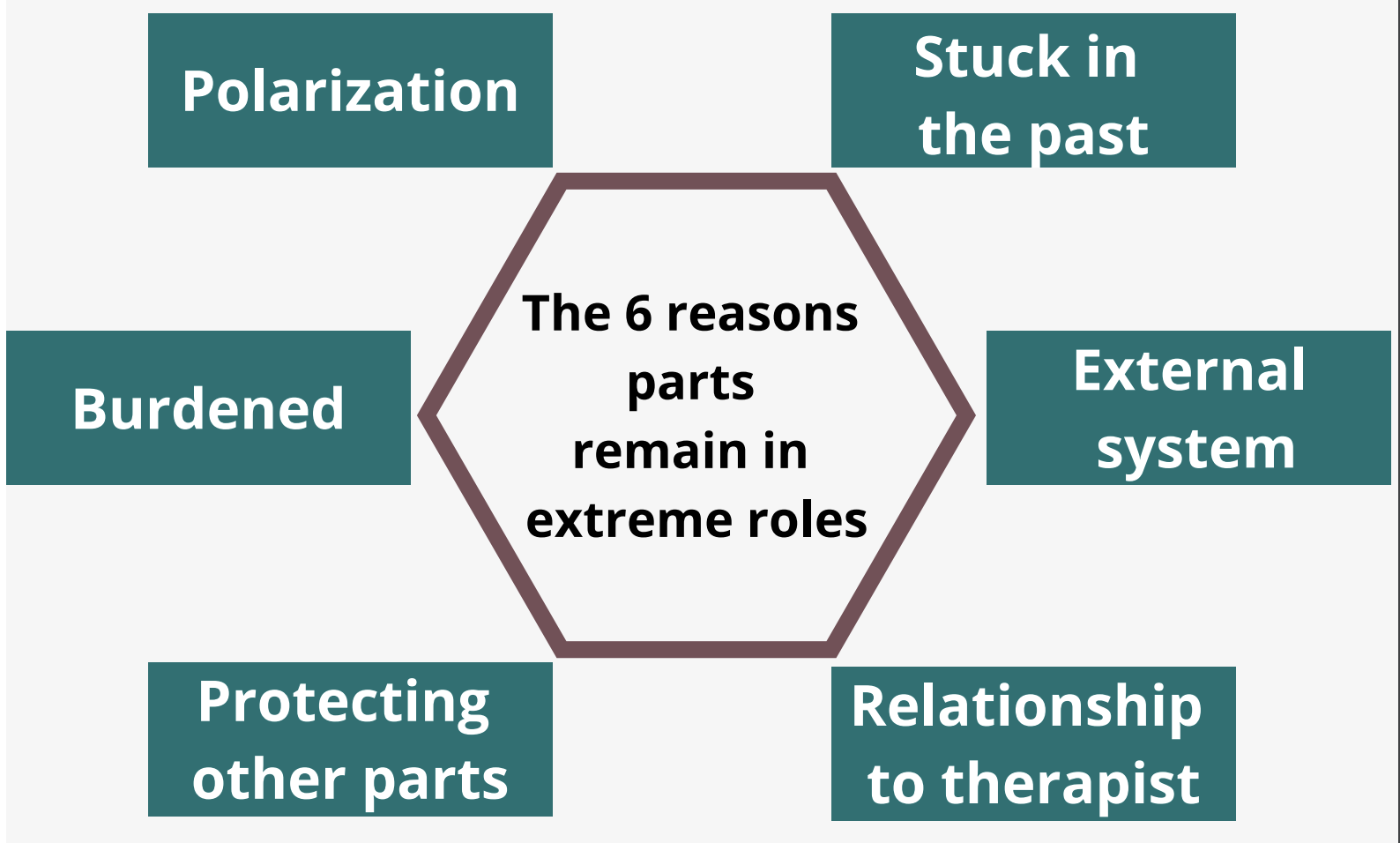I find Richard Schwartz’s writings always inspiring and practical. Having studied psychotherapy for many years, I have rarely come across writings and books that are as clear and profound as some of the IFS (Internal Family Systems) books written by the founder. The book in which Dick Schwartz talks about these reasons is the first edition of the book "Internal Family Systems Therapy” written by him and Martha Sweezy (you might find this information in later editions of the book too).
I came across these 6 reasons soon after my level 1 training and, since then, I have found them extremely useful to support clients whose system does not seem to make any shift despite working consistently on certain extreme parts.
If this is happening to you with your clients or, indeed, if you are working with some of your extreme parts that do not seem to consider making any change at all from their extreme roles, please read along. Please note that I find extreme parts that are involved in OCD to be much more resistant to any form of change that the usual, and therefore it is important that you seek professional help in dealing with these parts.
Being mildly dyslexic, I struggle to remember lists of words in a specific sequence, and I find it easier to have them represented in an image, which I have created and I am adding here for those who, like me, might struggle to read the article and might benefit from a different way of absorbing information. Below is the image, and you can find a link to download the pdf file at the bottom of the article. As always, feel free to use my resources freely. I only ask that you keep the logo and my website visible so that others can benefit from my resources.
Extreme parts
The 6 reasons why extreme parts remain stuck in their extreme roles and do not consider chage.
Reason 1 - Polarisation with another part
As Dick Schwartz never fails to mention, parts (very) rarely come on their own, but they come in pairs, and, in my experience, they might come with entire teams.
Polarities are undeniable part of our reality. We perceive shadow because of the light. We appreciate sadness because we know what joy is.
Similarly, in our internal family system, we might have a part that wants to lose weight and another part that is totally opposed to making any changes to the appearance of the body.
If you are working with a part that does not want any change in appearance and this part refuses to make any shift into a less extreme role, it is wise to ask this part, from Self, whether there is one (or more) part that might take over, have their way or take the system somewhere where the part does not want the system to go.
If you manage to identify the polarised part or parts, then you can apply the techniques of working with polarisations to support the system.
Reason 2 - the part is protecting other parts
This is, by far, the most known of the reasons. We are talking about the existence of exiles. If a protective part does not want to change anything of what they do, it is wise to enquire “are you protecting any other parts?”. The part usually knows quite well if they are protecting other parts. Depending on how much Self energy is present and if there are no blockages that keep the part from revealing what or who they are protecting, you should get a clear answer.
Usually extreme parts protect extremely burdened exiles, which means that accessing this information might not be easy. Extreme burdens sometimes come with a lot of shame, which is the number 1 reason for parts to keep secrets and not reveal their presence. If you do not get a clear answer, the rule of thumb is to check if there is enough Self energy; if that is the case, ask parts to step back, do not lose faith, and give it another go if the first time you do not get an answer.
Reason 3 - the part is stuck in the past
This is, perhaps, one of the “simplest” case scenarios. The technique that we use here is called “update”. Simply put, once we establish a connection between Self and part, invite the Self to do one or more of the following
Ask the part “how old do you think I am?” - usually the part sees Self as much younger
Ask the part if it wants to be updated and find out what is happening in the present. I like to ask Self to use the quality creativity (one of C’s) to provide exactly the information that the part needs to hear. This could be job, career, where the person lives in the present and any important relationships. I would not encourage telling the part about problems or struggles at this point. If you notice that this is happening, there might be a part talking, and not Self
Explain to the part why we are making contact and what is happening in the here-and-now. For example have Self say “we are doing therapy now, this is Alessio (obviously use the therapist’s name), my therapist, and we are both here to get to know you because we really want the system to make some changes that are needed, and we cannot seem to understand why no change is happening. Would you like to help us?”
You might be surprised at how effective a good update can be.
Reason 4 - the part carries burdens
This one of the most known aspects of IFS. You might want to read some of my other articles on burdens and unburdening. At the time of writing this article, I have published 4 articles on burdens and unburdening. Here they are
The Main Reasons Why "Unburdening" An Exile Might Not Lead To Full Healing
Gendered Burdens - How IFS (Internal Family Systems) Sees Burdens Related To Gender
You might also want to navigate to this page, where future articles on burdens will be automatically added. For updates on future articles, you can always join my newsletter using the form at the bottom of the page.
Reason 5 - something in the person’s external environment is activating the part
Sometimes, despite spending time connecting, witnessing and unburdening a part, nothing significant changes, and the part remains in its extreme role. If this is happening, and you are sure that you are applying IFS correctly, then it is advisable to ask the stuck part a version of “Is there anything outside of the system that is activating you?”.
The part will usually tell you what is going on, and, if you suspect there is something specific in the external world that is having an impact on the part, you could ask the part to confirm it. For example, if someone if going through a difficult divorce with heavy financial implications, it would make sense that a part that is extremely worried about making money does not want to change anything of their role until something shifts in the external environment. If this is the case, it is best to support the system to deal with the financial worries of the divorce before asking or expecting that the part changes role.
Reason 6 - something in the relationship between the therapist and client is activating the part
This is something that any form of psychotherapy that pays attention to the relational dynamic between therapist and client gives plenty of attention. I am trained in a highly relational form of Gestalt psychotherapy and it comes natural to me to keep an eye on the quality of the relationship between the client and me. This was one of the most difficult aspects of psychotherapy to master and it might not be everyone’s cup tea.
IFS is a form of relational therapy and it is advisable to assume that clients have parts that are continuously assessing the therapist. The most common client’s parts that might be particularly sensitive to the relationship with the therapist are
Care-giving parts - clients with these parts might try to “please” the therapist and be very receptive to any sign of therapist’s parts that are impatient or pushing for change;
Non-trusting parts - any client who has experienced betrayal and, generally, has not been told the truth in their most important relationships might not trust other people, and the therapist is no exception. It is always advisable to ask clients if they have had prior experience of therapy because, if previous attempts to therapy were not successful, the client is likely to have parts that do not trust the therapy and the therapist;
Shame and embarrassment - this is particularly true for people who have been victim of bullying and/or discrimination of any sort. Racial, sexual, gender, socio-economic, cultural, religious reasons, and many more, can be at the base of traumatic experiences that cause deep sense of shame and embarrassment associated to them. If the client has parts that are potentially ashamed or embarrassed of what the therapist may think, they will not allow the content of these shameful events to be easily shared with the therapist. It is important to be very respectful and sensitive to these parts.
In conclusion
I hope this article has helped you understand the six main reasons why parts get stuck. Please remember that every system is different and that change is a very complex matter. There might be other reasons that might keep a part stuck, and it is always good to book a clinical consultation with an expert in IFS if you would like to get more support.
My message is that you should not get disheartened if extreme parts are not changing. By listening to this part, you can bring a lot of clarity to whatever is happening.
I am going to add here a button for the PDF download of the diagram for a quick reference. Please share, like and comment if you wish.











